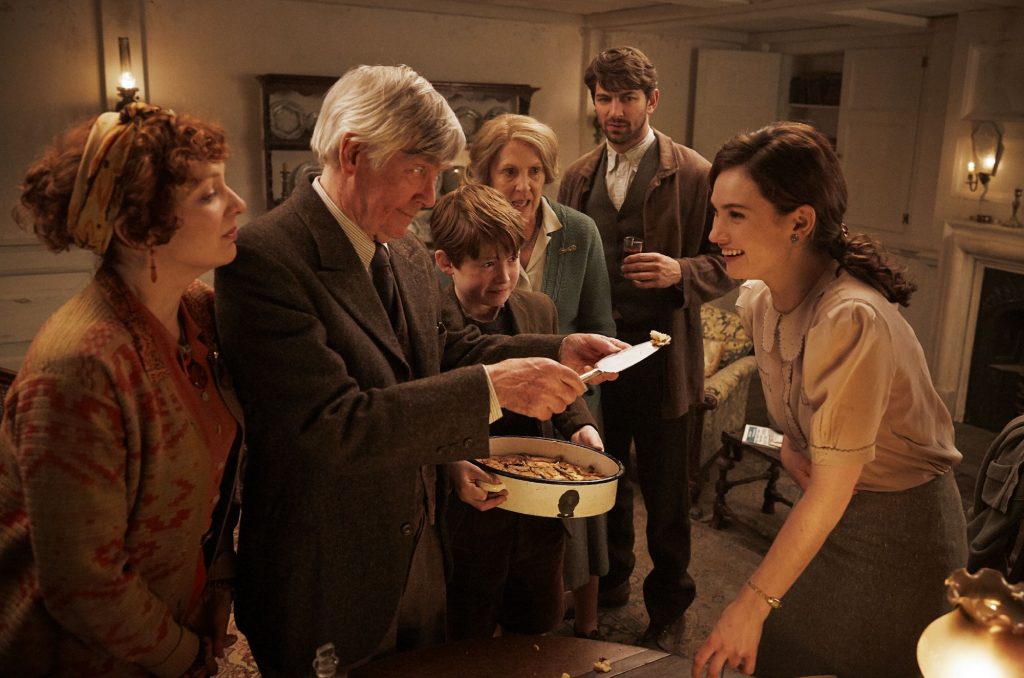The Brilliance of Netflix’s “The Guernsey Literary and Potato Peel Pie Society” in the Retelling of the Nazi Occupation in Guernsey

"Guernsey Literary and Potato Peel Pie Society" (2018, Netflix)
The collective history of World War II is well-documented, with an array of archival literature and videography meticulously depicting the conflict’s tragedies and horrors. Films, in particular, serve as brilliant media for narrating the events of World War II by weaving historical facts within fictional stories. Historical fiction has the power to capture the attention of audiences with fascinating accounts enhanced by the truth.
The Guernsey Literary and Potato Peel Pie Society, a Netflix cinematic production starring Lily James, is one such film that tells the story of the fictional character Miss Juliet Ashton, a young writer in London, who discovers a book club founded on the island of Nazi-occupied Guernsey. Her enchanting journey to the island in the hopes of learning about the literary society is substantiated by many nods to the past, which educate viewers about the occupation. The Netflix film depicts a Guernsey that had been swiftly transformed into a prison-like fortress between 1940 and 1945, with German lookouts erected at every point by the coast to face the sea. Dawsey Adams, a member of the Guernsey Literary and Potato Peel Pie Society, serves as Juliet’s primary source in disclosing details about the Nazi occupation as he willingly answers most of her queries. She searches for answers from other members of the book club to learn of their experiences during the war, eventually leafing through newspaper archives that elucidate the truth about the war-stricken, isolated island unable to defend itself from subjugation.
One of the film’s enchanting aspects is that it leads both Juliet and the viewer through the process of the occupation of Guernsey, a relatively unknown island. As Guernsey was and is a small self-governing dependency of the British crown located in the English Channel, much of the British mainland was initially unaware of not just the Nazi infiltration, but also of the island’s existence. Juliet and the audience learn of the occupation as they hear stories from Dawsey, who recounts the island’s residents being isolated, coerced, and forced to grow potatoes for the Germans. The production’s decision to focus on the plight of Guernsey helps shed light on the trials and tribulations of places and people whose stories may be less known, but are equally inspiring. The film also explores how communities develop underground societies to endure fraught times. German soldiers had imposed a curfew on Guernsey, yet Dawsey and other island residents gathered at a home to uplift each other during the difficult times. The group is suddenly accosted by a band of Germans in uniform, demanding papers and their reasons for breaching curfew. Elizabeth McKenna, the most fearless of the group, pronounces they are part of a book club, hastily naming it the Guernsey Literary and Potato Peel Pie Society. The club is registered in the Germans’ books and authorized to meet weekly; the members are even permitted to collect as many books as possible from a bookshop that the German forces forced into eviction, prohibiting the inhabitants any access to it. The viewers learn of these details when Dawsey sends Juliet a letter, requesting whether she could find a copy of Lamb’s Tales from Shakespeare in a mainland English bookshop because there are no longer bookshops on the island in the wake of its liberation from the Nazi regime.
The film crafts a tragically poignant and tender story of a group of people attempting to cope with a dictatorial occupation that tore their community apart. Literature serves as the perfect escape for these individuals, offering an imaginary alternative to their destroyed and vulnerable island home. The chronicle weaves an impactful narrative that depicts how the occupation altered life for the defenseless Guernsey inhabitants, thus informing its audience of a significant event in the Second World War not generally discussed and evaluated. Nothing less can be expected of Lily James, the lead actress; through Juliet, she mirrors the experience of the viewer, learning about the grim yet inspiring history of Guernsey. I recommend the film to anyone interested in the Second World War and the collective narratives that have impacted the way we remember the war today.
Editors
Clara Apt, Managing Editor
Makenzie Rodrigues, Copy Editor

Sara Radovic (she/her) is a second-year MA candidate in International Relations at NYU. She obtained her bachelor’s degree in English with a minor in art history from Rutgers University in 2022, where she also wrote for the Rutgers Undergraduate Law Review (RULR). Some of her articles for RULR include Importance of National Paid Maternity Leave, The Controversial Conversion of Hagia Sophia and Law Involvement in Enhancing Education for Students with Dyslexia. She currently helps clients file claims with the September 11th Victim Compensation Fund. Her primary interests include international law, human rights law, and selective commemoration of victims, particularly in the Balkans. When not studying or working, you can find her enjoying an iced vanilla oat latte at Ralph’s Coffee or exploring art museums in New York City.




